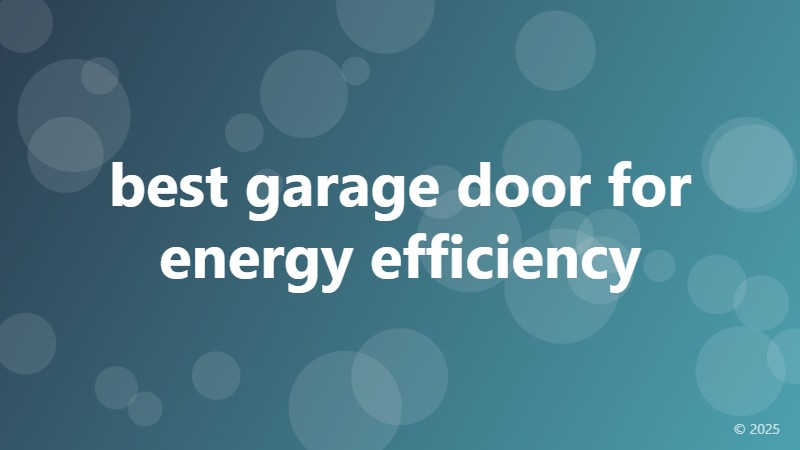best garage door for energy efficiency
 ```html
```html
Choosing the Best Garage Door for Energy Efficiency
A garage door is often the largest single opening in your home, making it a significant contributor to energy loss. A poorly insulated garage door can lead to uncomfortable temperatures inside your house, higher energy bills, and even damage to your belongings. Choosing the right garage door for energy efficiency is a smart investment that pays off in comfort and cost savings. This guide will help you navigate the options and find the best garage door for your needs.
Understanding R-Value: The Key to Energy Efficiency
The R-value is a measure of a material's resistance to heat flow. The higher the R-value, the better the insulation. When looking for an energy-efficient garage door, pay close attention to its R-value. Doors with R-values of 10 or higher are generally considered highly energy efficient. You'll find this information listed in the door's specifications.
Types of Insulated Garage Doors
Several types of garage doors offer excellent insulation. Let's explore some of the top contenders for energy efficiency:
1. Insulated Steel Garage Doors:
Steel garage doors are a popular choice due to their durability and affordability. Many steel doors are now available with polyurethane foam insulation, significantly improving their R-value and energy efficiency. Look for doors with thicker steel gauge and higher R-values for optimal performance. A well-insulated steel door can easily achieve an R-value above 16.
2. Insulated Wood Garage Doors:
Wood garage doors are known for their classic appeal and excellent insulating properties. Solid wood doors offer superior insulation, but their cost is typically higher. Composite wood doors are a more budget-friendly alternative that still provides good insulation. The R-value of a wood garage door can vary significantly depending on the thickness and type of wood, as well as any added insulation.
3. Fiberglass Garage Doors:
Fiberglass garage doors are a high-end option that offers exceptional insulation and durability. They're resistant to dents and rust and can boast high R-values. However, they are generally more expensive than steel or wood doors.
Factors to Consider Beyond R-Value
While R-value is a crucial factor, several other aspects influence a garage door's energy efficiency:
- Seal: A tight seal around the door's perimeter is essential to prevent air leakage. Look for doors with weather stripping and thresholds designed to minimize drafts.
- Glazing: If you have windows in your garage door, choose double- or triple-paned insulated glass to enhance energy efficiency. Consider low-E coatings to further reduce heat transfer.
- Installation: Proper installation is crucial for maximizing the energy efficiency of your new garage door. A poorly installed door, even if highly insulated, can still allow air leakage.
- Garage Size and Climate: The size of your garage and the climate you live in will impact your energy needs. In colder climates, you'll want a door with a higher R-value than in warmer climates.
Finding the Best Garage Door for Your Home
Finding the best energy-efficient garage door involves careful consideration of your budget, aesthetic preferences, and climate. Start by determining your desired R-value and then compare different door types and brands. Don't hesitate to consult with garage door professionals for expert advice and installation services. Investing in a high-quality, energy-efficient garage door is a worthwhile investment that will pay dividends in comfort and lower energy bills for years to come. Remember to factor in the total cost of ownership, including installation and potential long-term maintenance costs.
Maintaining Your Energy-Efficient Garage Door
Once you've installed your energy-efficient garage door, proper maintenance is key to preserving its efficiency. Regular inspections for any air leaks or damaged seals are recommended. Addressing these issues promptly prevents increased energy consumption. Additionally, lubricating moving parts ensures smooth operation and prevents wear and tear, prolonging the life of your investment.
```